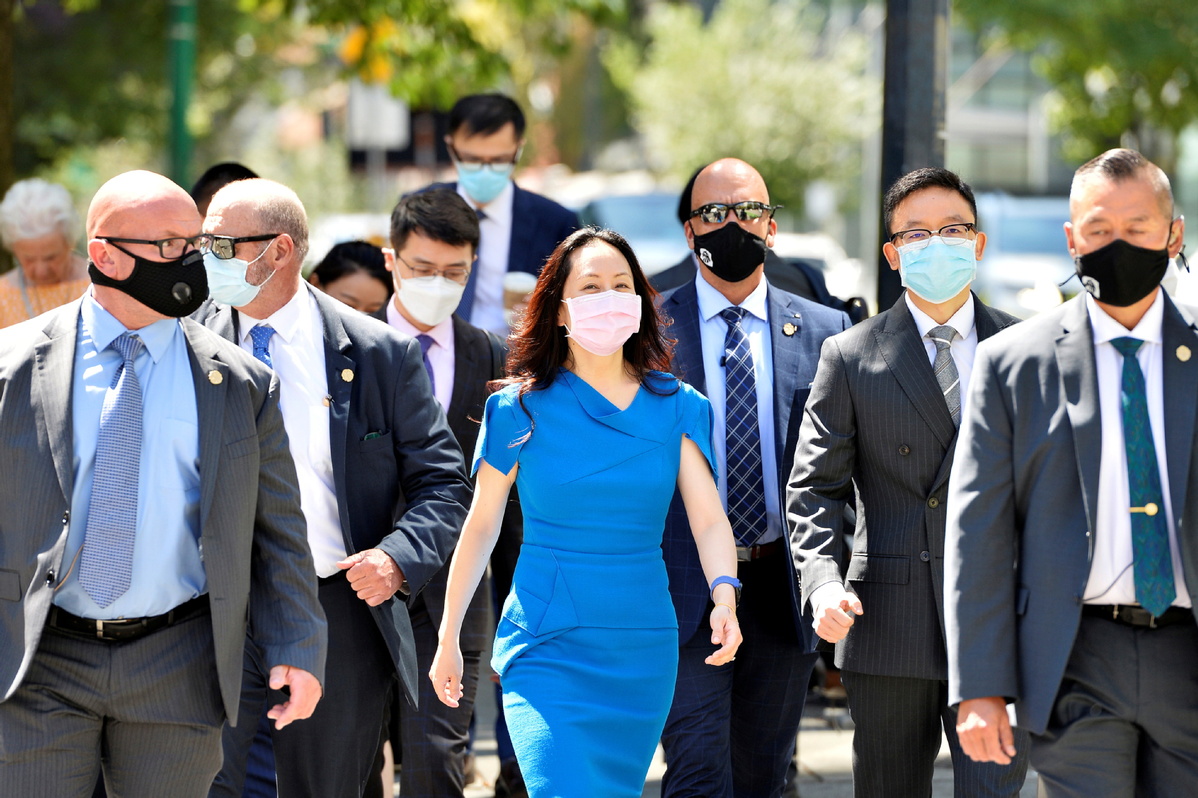Meng extradition case concluding
By RENA LI in Vancouver | China Daily Global | Updated: 2021-08-05 11:10

Huawei Technologies Chief Financial Officer Meng Wanzhou was back in British Columbia Supreme Court in Vancouver on Wednesday for the final stretch of extradition proceedings that could send her to the US.
Over the next several weeks, Meng's defense team will argue that the US "manipulated" the case for committal and the certified evidence before the court; that the US has both "mischaracterized" evidence and "omitted" other evidence in order to establish fraud; and that its "misconduct in certifying misleading evidence", coupled with its "shifting theory" of the case, has "corroded the fairness" of the Canadian legal proceedings, according to a statement released by Huawei on Wednesday.
This week's hearing will feature defense arguments that the US misled Canada by omitting key details from the record of the case provided to the court to justify Meng's extradition.
Meng, 49, was arrested by Canadian authorities at the request of the US, at Vancouver International Airport on Dec 1, 2018, after arriving on a Cathay Pacific flight from Hong Kong. The daughter of Huawei founder Ren Zhengfei has been living under house arrest in Vancouver.
She is accused of misrepresenting the Chinese telecom company's relationship with Skycom in a PowerPoint presentation to HSBC in 2013 and putting the bank at risk of violating US sanctions against Iran. Meng and Huawei have repeatedly denied the accusations.
Meng's defense team began Wednesday's hearing with an application for a "third-branch argument", that she should be freed because of the "manifestly unreliable" record of the case (ROC), a document provided by the US that summarizes the accusations against her.
In the legal arguments before the hearing, defence lawyer Mona Duckett said that the US was "selective" in what it disclosed to Canada in its extradition request for Meng. Duckett told the court Wednesday that the US "misused" the extradition process, calling its conduct "egregious" and "troublesome".
She said Canada should rely on the good faith of its extradition partners to tell the truth without "deliberate manipulation".
"The only remedy we say lies in a stay … to meaningfully denounce the misleading conduct," Duckett told Associate Chief Justice Heather Holmes.
Meng's lawyers have claimed her "abuse of process" motion is based on four branches of misconduct: (1) the politicization of her case by former US president Donald Trump and others; (2) an arrest that was a "master class in how to violate a person's Charter rights"; (3) the certification by the US of "manifestly unreliable and potentially misleading" evidence aimed at the Court; and (4) a claim of jurisdiction by the US that constitutes a "brazen violation" of customary international law.
Meng's lawyers will urge the court to consider the "cumulative impact" of the different branches and that a stay of the proceedings should be granted as a remedial and compensatory measure.
Richard Kurland, a Vancouver immigration lawyer and member of the Law Society of BC told China Daily that the Crown has represented the US and the extradition standard has been reduced in the case.
"You just have to prove a very low standard of fraud. The fraud in this case is the international reputation of HSBC. The technical thing behind the charge of fraud alleged by America is that HSBC suffered, not in terms of money, in terms of the reputation of the bank (HSBC)," said Kurland.
"How can there be reputational damage to a bank like this? Regionally, this case was about Iran sanctions (by the US). But when it turned out here in Canada, the case morphed and morphed into a fraud case against HSBC's reputation."
Alykhan Velshi, vice-president of corporate affairs for Huawei Technologies Canada, said it has become clear that Meng's case is about trade and geopolitics rather than justice.
"This is a political prosecution, and we think that Ms Meng was detained at the request of the US, so that she could be used as leverage in the US-China trade war. She's essentially a pawn in this complex dispute between countries," Velshi said. "The challenge is that how do you put the toothpaste back in the tube, and ultimately we have confidence that she should be allowed to return to China."























